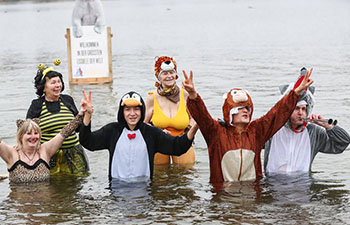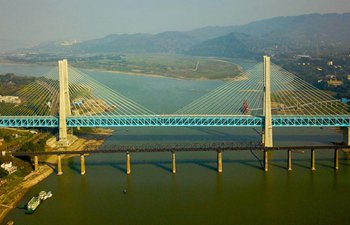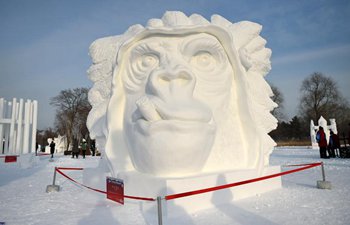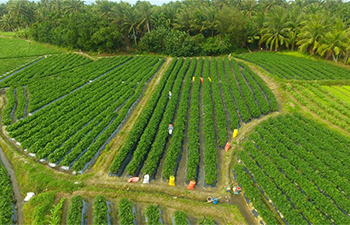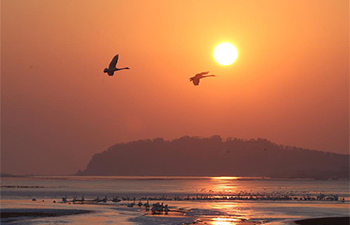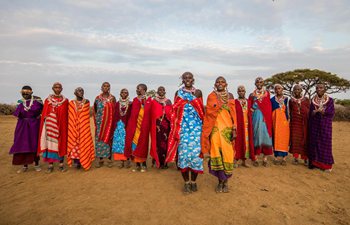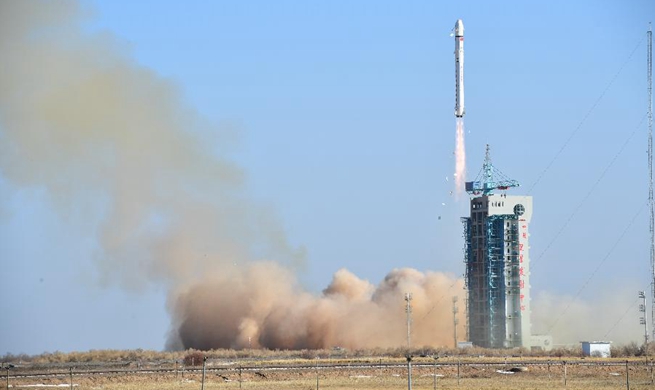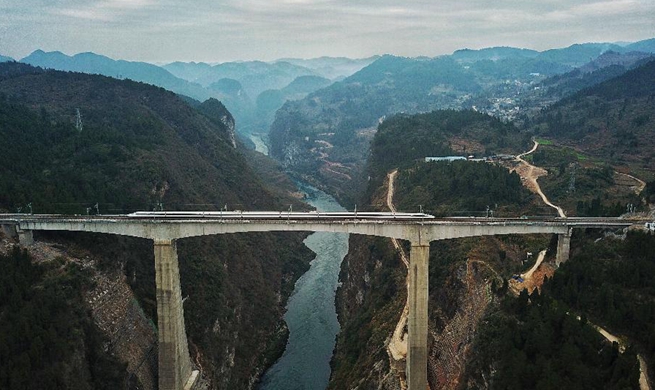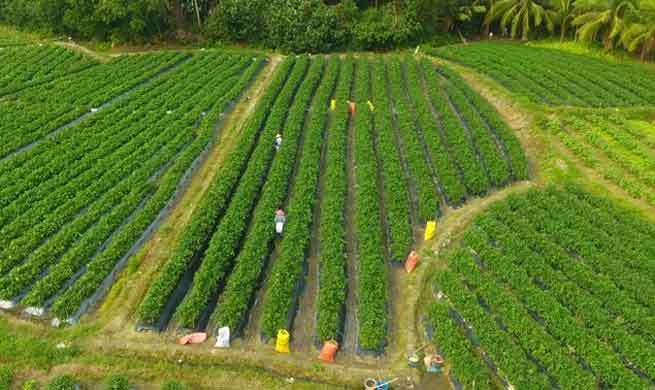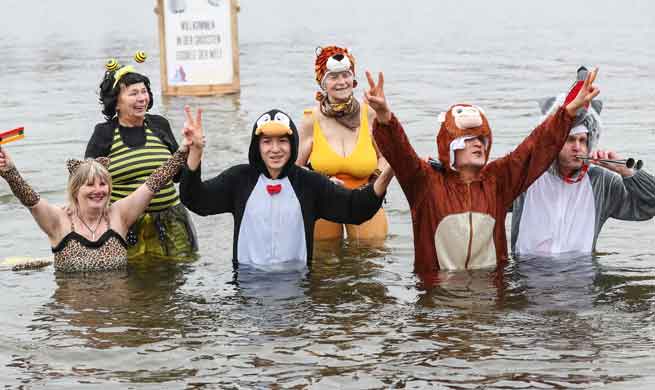by Peter Mertz
DENVER, the United States, Jan. 13 (Xinhua) -- Across America's west, prayers for snowfall are being offered to the skies as the winter season has offered little relief to drought stricken areas thus far.
"Draw a line from eastern Washington down to Colorado - everything north is OK; everything south is in danger," said National Weather Service (NWS) meteorologist Russell Danielson.
The enormous "danger zone" includes seven large western states -- California, Oregon, Idaho, Nevada -- and the "four-corner" states of Arizona, Colorado, Utah, and New Mexico.
Danielson told Xinhua Friday that these areas are seeing up to an 80 percent reduction in snowfall so far this season, spelling a disastrous upcoming fire season unless more snowpack occurs.
"This Is Literally the West's Worst Winter in 60 years," a headline in influential Outside Magazine read last week, pointing to the lack of snow hurting America's 5.6 billion U.S. dollar ski industry.
In the 2016-2017 season, Colorado ski resorts saw 100,000 fewer visitors than the previous year and an overall 2.8 percent annual decline in North American ski areas, according to Colorado Ski Country magazine.
Skiing officials are still hopeful 2017-18 will reverse that trend.
"Much of western Colorado is dependent on the ski industry economy, so no snow means no income," said Carbondale Airbnb host Glenn Nemhauser.
While last season heavy December snows pushed visitor totals upward, this year, record low precipitation throughout the west triggered one of the worst Decembers in skiing history.
"There was literally no snow and no base...I went out and scratched up my skis on rocks it was so bad," Ben Edwards told Xinhua Thursday of his experience at Aspen Mountain last month.
Without snow, seasonal ski guests are reluctant to make room reservations, a glaring problem that affects many parts of Colorado's economy.
In Glenwood Springs and Carbondale, where America's wealthiest town and most famous skiing area, Aspen fuels the small economies of the 50-mile-long Roaring Fork valley, business owners told Xinhua their sales were way down in December.
"The lack of snow also affects many, many small businesses and thousands of people in this part of the country," Nemhauser told Xinhua Thursday. "Our bookings were dead in December."
Both the NWS and Colorado's ski resorts are hoping for heavy snowfall soon - that occurs regularly in the region at the end of January and early February.
"We're not banking on it...and we definitely have to accommodate for the lack of snow," said Liz Rovira, a public relations spokesperson for Aspen Skiing Company.
Aspen Skiing Co. owns and operates Aspen Snowmass that has four mountains including Buttermilk -- the site of the annual X Games.
The U.S. ski industry employs about 60,000, mostly seasonal workers, with mountainous Colorado and its 34 resorts leading the nation, according to U.S. Department of Labor statistics.
The dry weather has put extra pressure on the marketing arms of Colorado's ski resorts to find creative ways to bring skiers to the slopes, despite the conditions.
Last month, to celebrate its 50th anniversary, Snowmass Mountain advertised a one-day "throw-back" promotion offering lift tickets for 6.50 U.S. dollars -- the actual ticket price in 1967.
With current single day lift tickets at 155 dollars, the screaming deal triggered an invasion of some 10,000 skiers who came mostly from Denver, three hours away, to enjoy a day on the mountain.
That same weekend, Rovira's team staged a "Banana Days Scavenger Hunt" whereby Snowmass employees hid 1,967 plastic containers shaped like bananas all over the resort and slopes for guests to find.
Prizes inside included Chap Stick, free future lift tickets, and a Caribbean vacation.
"The industry has pushed season pass sales and that has helped us financially," said Dave Byrd, Director of Risk and Regulatory Affairs at the National Ski Areas Association (NCAA).
The Denver-based NCAA points to passes as giving their bottom line a huge boost and "making skiing better than it's ever been, across the country."
The two biggest ski season lift passes in North America are the Epic Pass from Vail Resorts for 859 U.S. dollars, and the Mountain Collective pass for about half that amount.
With Vail's recent acquisitions of the huge Whistler Blackcomb ski area in Canada and Stowe in the state of Vermont, the Epic Pass now gives unlimited access to 13 resorts in North America.
But all the marketing gimmicks in the world cannot replace the critical white powder that forms the foundation of skiing's economic viability.
NWS officials told Xinhua that the next two weeks do not look promising for huge snowfalls, but in the mountains, resorts are already seeing a change.
"We had seven inches at Snowmass last night," Rovira told Xinhua Thursday. "We've had 17 inches in the past two weeks and more snow is expected this weekend."
"We are adjusting to climate change with a number of things," Byrd told Xinhua.
As seasonal temperatures continue to climb, Byrd's organization has "moved to a four season business model," to increase income in spring, summer and fall seasons.
Additionally, resorts are are responding with efforts to expand their water rights for additional snow making, "doing everything we can to deal with this," Byrd said.
Climate scientists are quick to point to global warming as the culprit of the dry weather, while conservatives point to record cold temperatures in the East as proof global warming is overrated.
U.S. President Donald Trump, who once called climate change a "hoax, tweeted in late December that cities gripped by biting cold snaps on the East Coast could "use a little bit of that good old Global Warming."
Last week, former U.S. Vice President Al Gore, a champion of reducing harmful ozone emissions, tweeted that the record cold temperatures in the East are "exactly what to expect from the climate crisis."
Gore posted that "Global Warming is leading to later freeze-up of the Great Lakes and warmer lake temperatures," a quote from Dr. Katharine Hayhoe of Texas Tech University.
"It is the collision of cold Arctic air with relatively warm unfrozen lake water in early winter that causes lake effect snows in the first place," Hayhoe said.
"Mother nature is notoriously cyclical especially when it comes to snow and cold weather," noted Byrd.
For instance, Utah had record back-to-back ski seasons, before this current drop, and the Mid-west is having a great 2017-18 after two bad seasons, according to Byrd.
"There's conflicting research on a single event being caused by global warming," Danielson said, referring to the aberrant East Coast conditions.
A report released Thursday by World Weather Attribution said the brutal two-week East Coast cold snap wasn't global warming, but a natural occurring anomaly.
The group of international scientists said climate change has made such cold spells less common and less intense.




